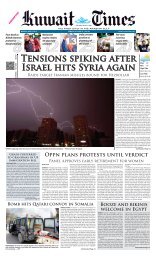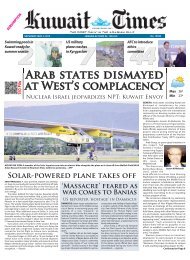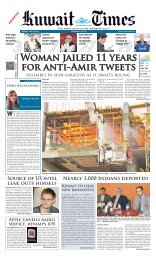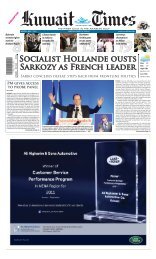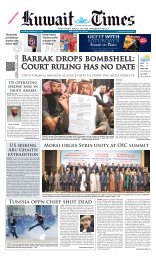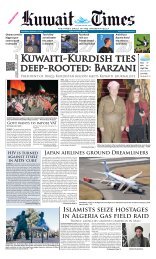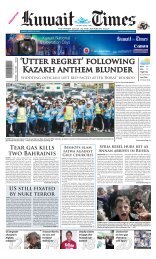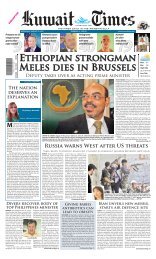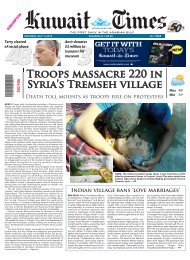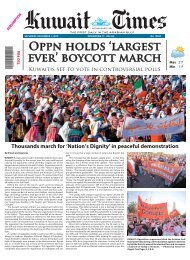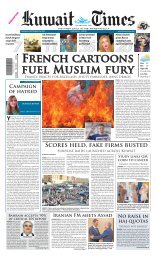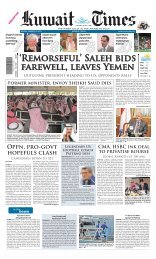KT 3-4-2013_Layout 1 - Kuwait Times
KT 3-4-2013_Layout 1 - Kuwait Times
KT 3-4-2013_Layout 1 - Kuwait Times
Create successful ePaper yourself
Turn your PDF publications into a flip-book with our unique Google optimized e-Paper software.
WEDNESDAY, APRIL 3, <strong>2013</strong><br />
Indian court ends travel ban on Italy ambassador<br />
KERBET AL-KHALDIYE: A Syrian woman carries her children near their makeshift refugee camp in the mountains in the area of Kherbet Al-Khaldiye, on the Syria-Turkey border. — AFP<br />
News<br />
in brief<br />
Saudi deports Yemenis<br />
SANAA: Thousands of Yemeni workers have been expelled<br />
from Saudi Arabia after it imposed new labor constraints<br />
affecting millions of expatriates in the oil-rich kingdom, an<br />
official said yesterday. The new regulations introduced by the<br />
Saudi labor ministry aim to reduce the number of foreign<br />
workers to create jobs for millions of unemployed Saudis.<br />
“Thousands of Yemenis had to leave Saudi Arabia. They were<br />
victims of an arbitrary application of the new regulations,” a<br />
Yemeni government official said. He said workers saw their<br />
residency permits torn into pieces by Saudi government representatives.<br />
Under the new rules, foreigners are allowed to<br />
work only for their legal sponsors in the kingdom while their<br />
spouses cannot take up jobs. Many foreigners enter Saudi<br />
Arabia on the sponsorship of a Saudi national but end up<br />
working for others, or set up their own businesses. Around<br />
one million Yemenis live in neighboring Saudi Arabia, transferring<br />
around $4 billion annually to their impoverished<br />
nation, according to non-official estimates.<br />
‘Restoring BBC’s reputation’<br />
LONDON: New BBC director-general Tony Hall took up his<br />
post yesterday, starting the task of restoring the reputation<br />
of the world’s biggest broadcaster that has been rocked by a<br />
child sex abuse scandal. Hall walked into the BBC’s<br />
Broadcasting House headquarters in central London to tackle<br />
an in-tray topped with the fallout from police investigations<br />
which concluded that the corporation’s late presenter<br />
Jimmy Savile was one of Britain’s most prolific sex offenders.<br />
The British Broadcasting Corporation was subsequently damaged<br />
by a botched television report wrongly indicating that<br />
a lawmaker was a paedophile.<br />
KHERBET AL-KHALDIYEH: For millions of Syrians displaced by<br />
fighting, every day is a struggle to survive, and for those in<br />
Kherbet Al-Khaldiye, that means eating and drinking whatever<br />
they can forage. “We eat herbs and collect stagnant rainwater to<br />
drink and wash in,” says 24-year-old Hisham, his head covered in<br />
a red and white chequered keffiyeh scarf. Hisham, who sports a<br />
budding blonde beard, was about to enter university when the<br />
fighting that has engulfed Syria erupted in 2011. Now he has<br />
joined the wave of his compatriots displaced by the conflict. In<br />
Kherbet Al-Khaldiyeh, a makeshift camp near the Turkish border,<br />
Hisham shows off a nearly-dry rivulet of water, infested with fungi<br />
and insects, surrounded by a swarm of children, many of<br />
whom have contracted skin infections because of the dirty<br />
water. Naida, 35, has seven young children. She bathes them in<br />
the infested water because the nearest clean water supply is several<br />
kilometers away.<br />
“We pick herbs like mint and mallow in the countryside and<br />
we cook them. We don’t have anything else to eat,” she says. “My<br />
husband used to work in a quarry, breaking stone, but now we<br />
have no more resources and no one to help us. Once we<br />
brought a kilo of potatoes per family-how can we all live on a<br />
potato a week?” Every so often, along with a group of other<br />
women, Naida goes to the nearest village in search of potable<br />
water. “We carry the cans on our heads for several miles,” she<br />
says, her blue eyes faded with exhaustion. Ibrahim, 25, was living<br />
in a village near the Minnigh airport-a key flashpoint between<br />
Syrian rebel forces and the regime. The non-stop air raids and<br />
shelling eventually forced him to flee, along with his two sons,<br />
and around 20 other families. His village was able to save a few<br />
of their animals and bring them along. “Each day we slaughter a<br />
chicken like that one,” he says, glancing at a paltry specimen as it<br />
passes. “That chicken would be for all of us, can you imagine<br />
how much each person gets?” he says with a bitter smile.<br />
More than a million Syrians have left the country since<br />
peaceful protests against the regime of President Bashar Al-<br />
Assad erupted in March 2011, spiraling into a civil war after his<br />
forces unleashed a brutal crackdown on dissent. But not everyone<br />
is able to cross the border and escape the violence, with<br />
many lacking passports or sufficient money to make the journey.<br />
Those residents have been forced to seek the safest places<br />
they can within Syria.<br />
For the roughly 100 people here, the safest place available<br />
was this strip of countryside in Aleppo province, where they live<br />
among the scattered remains of Roman ruins, a few kilometers<br />
from the Turkish border. At first, they were living in holes in the<br />
ground, lined with straw to provide some<br />
protection against the cold and the snow,<br />
Naida says. Now they have managed to<br />
get tents marked with the logo of the<br />
United Nations refugee agency UNHCR.<br />
In cold and unhealthy living conditions,<br />
the little makeshift village also<br />
struggles on with almost no access to<br />
Page 11<br />
medicine, particularly for sick children.<br />
“By the time they get to the nearest<br />
pharmacy, in Azaz (in northern Syria) or in<br />
Turkey, the child is dead,” 25-year-old Issa<br />
says, dressed in a warm coat in camouflage<br />
colours that came from Syrian rebel<br />
fighters.<br />
Seated on a stone, set back from the<br />
Jerusalem deal boosts<br />
Jordan in Holy City<br />
Displaced Syrians eat herbs to survive<br />
Air raids force thousands to flee<br />
Saleh hospitalized<br />
RIYADH: Former Yemeni president Ali Abdullah Saleh, who<br />
has been accused of meddling in his country’s fragile political<br />
transition, was in Saudi Arabia yesterday for treatment, a<br />
Yemeni diplomat said. Saleh arrived for medical tests and<br />
treatment in the Saudi capital on Monday, his party, General<br />
People’s Congress (GPC), said. He spent time recovering in a<br />
Riyadh hospital in June 2011 after an attack on his compound<br />
left him seriously wounded. A Yemeni diplomat confirmed<br />
to AFP that Saleh was in Riyadh and sources in the<br />
GPC said that Saudi Arabia chartered a plane to take him to<br />
the kingdom. Saleh was admitted to hospital, the head of the<br />
GPC parliamentary bloc, Sultan Al-Barakani, said. He did not<br />
elaborate on the nature of the treatment. After 33 years as<br />
Yemen’s head of state, Saleh left power in February 2012 as<br />
part of an agreement for the transition of power in the country,<br />
which also gave him and his family immunity from prosecution.<br />
He last visited Saudi Arabia in November 2011, when<br />
he travelled to Riyadh to sign the transitional agreement in<br />
the presence of Saudi King Abdullah, one of the plan’s main<br />
sponsors. —Agencies<br />
Page 8<br />
other residents, 80-year-old Rajab<br />
observes the life of the makeshift village<br />
in the middle of nowhere. “Under the<br />
tent, you feel the wind, the cold,” says<br />
Rajab, the patriarch of a family of 40<br />
people. “Who can live in these conditions?<br />
Look around you, who can live like<br />
this?” —AFP



